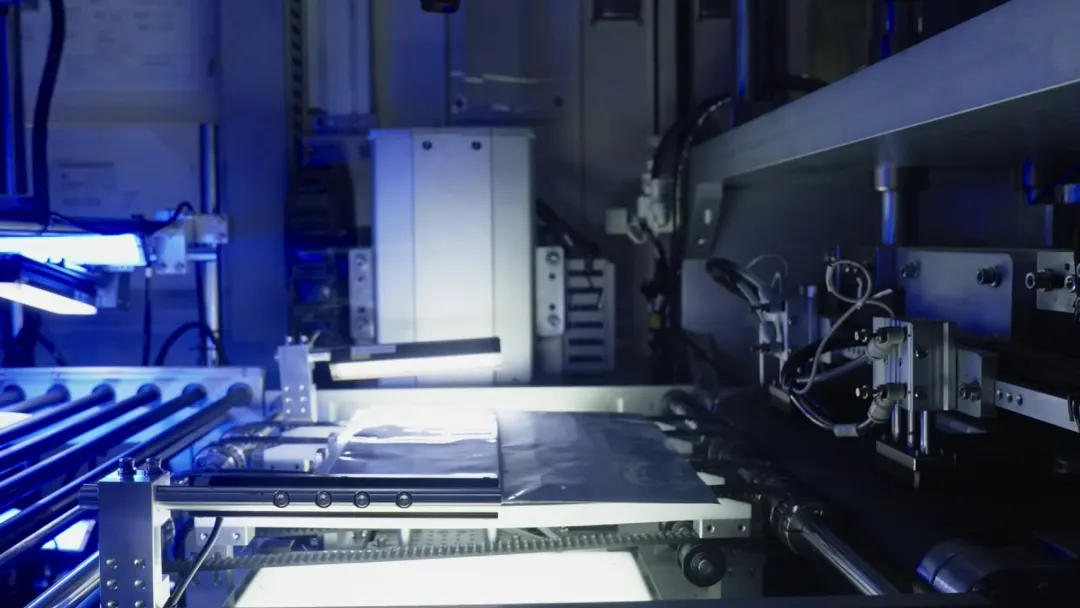Recently, Fulin Technology announced on an interactive platform that its all-solid-state battery research and development has officially progressed from the laboratory stage to the pilot production and delivery phase. The company plans to complete a pilot line for sulfide all-solid-state batteries with a designed capacity of 0.2 GWh by the end of this year and deliver 60Ah sulfide all-solid-state batteries to strategic partner clients. Furthermore, based on customer feedback and strategic planning, Fulin Technology aims to ramp up all-solid-state battery production to GWh levels by 2026. Solid-state batteries are recognized as the core direction for next-generation power batteries due to their high energy density and safety. In this competitive landscape, Fulin Technology is accelerating the industrialization of solid-state batteries through a 'dual-track' approach. Fulin Technology understands the rhythm of technological iteration, employing a research and development strategy of 'mass production generation, development generation, and pre-research generation,' focusing on both half-solid and all-solid-state technologies simultaneously. In terms of half-solid-state batteries, the company has prepared for three generations of iterations. As early as 2022, Fulin Technology successfully mass-produced and installed its first-generation half-solid-state battery using gel-solidified electrolyte technology, achieving an energy density of 280-300 Wh/kg and passing the industry's rigorous 1mm steel needle penetration test, demonstrating 'no ignition, no burning.' The second-generation half-solid-state battery, set to be mass-produced by the end of 2025, incorporates innovative oxide/polymer solid electrolyte coating and densification technologies, with an energy density surpassing 330 Wh/kg, fast charging capability exceeding 3C, and a cycle life of over 4,000 times, maintaining 90% energy even at -20°C. This product has successfully completed design and product verification, gaining recognition from high-end passenger vehicle clients and securing orders from leading companies in the low-altitude economy sector. The third-generation half-solid-state battery under development combines cutting-edge technologies such as high-conductivity solid electrolytes, fast ion ring technology, ultra-high nickel cathodes, solidification of anode surfaces, and expansion suppression, aiming to push the energy density to 400 Wh/kg while further enhancing thermal stability and safety. It is currently undergoing automotive-grade certification and industrial development, expected to enter mass production by 2026, solidifying its leading position in the half-solid-state battery field.
Fulin Technology previously stated that its all-solid-state battery R&D employs a high nickel ternary + soft pack + stacking process route, believing that the main bottlenecks for mass production of all-solid-state batteries lie in electrolyte materials and processes. The four main types of solid electrolytes—polymer, oxide, sulfide, and halide—each have their advantages and disadvantages. However, all solid-state batteries face interfacial issues that require external pressure constraints. The exceptionally flexible soft pack has become the optimal solution for current all-solid-state battery packaging, as it is compatible with liquid, half-solid, and all-solid systems, while also offering high energy density, uniform internal structure, even temperature and expansion, excellent cycle life, and low cost. Currently, Fulin Technology is using a sulfide and oxide/polymer composite system, with the sulfide system being a critical focus in the company's all-solid-state battery industrialization layout. This system utilizes a proven high nickel ternary cathode paired with a high silicon or lithium metal anode, with cells achieving energy densities exceeding 400 Wh/kg now in testing phases, and stable cycle performance. Its revolutionary significance lies in the use of all-solid-state electrolytes, fundamentally eliminating the risks associated with traditional flammable and explosive liquid electrolytes. Test results indicate that these cells can easily pass extreme safety tests such as puncture, shear, and thermal chamber tests, and exhibit self-extinguishing capabilities at the cell level during thermal runaway. The latest progress disclosed by Fulin Technology regarding solid-state batteries indicates that this battery system has successfully transitioned from the laboratory to the stage of industrial development.
The oxide/polymer composite system employs a more challenging yet potentially high-performing lithium metal anode and high nickel cathode, with theoretical energy densities potentially soaring to 500 Wh/kg, while requiring relatively low pressure for battery operation. Currently, Fulin has successfully overcome key material bottlenecks, developing composite electrolyte materials that can accommodate both lithium metal anodes and high nickel cathodes, and has innovated efficient production processes for ultra-thin electrolyte layers, laying a solid technical foundation for achieving 500 Wh/kg ultra-high energy density batteries in the future.
In terms of business positioning, Fulin Technology is not limiting its solid-state battery achievements to the laboratory but is rapidly transforming them into tangible commercial orders and market first-mover advantages. The company's strategic vision focuses on three trillion-yuan-level tracks: new energy vehicles, the low-altitude economy, and humanoid robots, which are regarded as the next generation of intelligent terminals. With the 'low-altitude economy' first included in the government work report for 2024, its development has entered the fast lane, with institutions predicting that its market scale will reach 1.5 trillion yuan by 2025. Electric Vertical Takeoff and Landing (eVTOL) vehicles, as the core carriers of the low-altitude economy, have much higher demands for energy density, ultra-high power discharge rates, and extreme safety compared to ground passenger vehicles. Reports indicate that Fulin Technology's second-generation half-solid-state battery has already secured significant orders in this area. In July, it was revealed that Shanghai's Shiji Technology is an important customer of Fulin Technology, which will exclusively supply the second-generation half-solid-state eVTOL battery for the E20 model. This model recently received an intention order of up to $1 billion from UAE company Autocraft, setting a record for the largest single purchase amount in China's eVTOL sector. Additionally, Fulin Technology has secured contracts with XPeng Motors’ affiliate, XPeng Huitian, to provide high-voltage power batteries, high-voltage connectors, and low-voltage connectors for its next-generation flying car prototype. Currently, Fulin Technology's client base continues to expand, covering numerous key players in the low-altitude economy, including GAC, Dongfeng, leading U.S. eVTOL companies, and Geely WoFei.
In humanoid robotics, Fulin Technology has begun sample deliveries of its solid-state battery products to several leading humanoid robot companies. Humanoid robots are considered the next revolutionary intelligent terminals following computers, smartphones, and new energy vehicles, with market potential targeting trillions. In the early stages of commercialization in this field, cost sensitivity is relatively lower than that of mass-produced passenger cars, providing ideal early commercialization scenarios for high-performance but still costly solid-state batteries.
In conclusion, from its previous proactive layout to the mass production of half-solid-state batteries, and now to the imminent completion of the pilot line for all-solid-state batteries, Fulin Technology has carved out a clear and determined 'dual-track' path in the solid-state battery field. Currently, Fulin Technology is rapidly advancing its sulfide all-solid-state industrialization while also having relevant forward-looking reserves in the oxide/polymer system, deeply binding itself to emerging fields such as the low-altitude economy and humanoid robots, showcasing its technological transformation capabilities and keen market insight.
Fulin Technology Advances Solid-State Battery Development to Pilot Production Stage

Images

Share this post on: